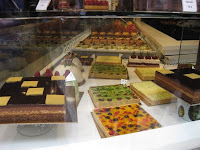 I am ill. This is as disorienting to the mind as it is disconcerting to the ego. I am ill. Only weaklings become ill. I must have done something wrong if I am ill. I am angry because I am not supposed to become ill. I take all these supplements, eat right, exercise, and still I become ill. I am ill. I am pissed.
I am ill. This is as disorienting to the mind as it is disconcerting to the ego. I am ill. Only weaklings become ill. I must have done something wrong if I am ill. I am angry because I am not supposed to become ill. I take all these supplements, eat right, exercise, and still I become ill. I am ill. I am pissed.As a child and young man, the Buddha was sheltered and kept from seeing any of what is bad in life. When he first left his father's house, the first surprise he encountered was an ill person. He had never seen one and (so the story goes) never been ill himself. This was the first pillar of his awakening, the realization that illness was possible. Illness began the opening of his awareness. Much later, after he achieved enlightenment, he noted that it is the nature of all beings to become ill, to age, and to die. Since he taught the unconditional acceptance of All That Is, one can assume that he meant for us to accept these truths, too. Great.
All right, I admit to overstating the case to make a point. Yes, I am annoyed that I am sick, but what is really causing me to suffer is the overlay of commentary on my illness. I am imperfect. My co-workers will be irritated or, worse yet, think I am faking it. I must have done something wrong to bring this on myself. And, simplest yet most deadly of all, I must struggle against this, to make it not so or make it go away. I must hate it. This is so very dangerous because it is a reflection of all the suffering in the world, which is brought about, in one way or another, because we cannot accept that life simply is as it is. (Even the suffering that is wholly due to the behavior of others can be attributed to this cause, as these selfish others are operating on false assumptions of entitlement to more than their fair share of resources or power, wellness or life). It is in our very nature to become ill. Period.
As for being believed, I do my very best to live a life of integrity, to be, as the Buddha advocated, entirely blameless. Of course, I cannot hit this high a mark, but I can strive to be this person through my actions. Being a man of integrity, when I say I am ill, I am believed. This is vitally important; I speak the truth almost always. If I find myself in a position where I cannot speak the truth, I choose not to speak. Except if there is a gun to my head, I can always choose not to speak. Another person's anger because I will not speak does not obligate me to speak. One of the results of my honesty is that I need not fear that others may think badly of me when I cannot work due to illness. But I need to be reminded of this because of those decades of doubt engendered by the teachings of parents and the skepticism of authority figures when I was ill. I also have some decades of acting irresponsibly to account for. But I am not that man now; I am this one. The Buddha once said, "The past should not be followed after and the future not desired; what is past is dead and gone and the future is yet to come." I am the man I am today and not the man I was yesterday; nor can I project who I will be in the future.
So I am ill. I will take pleasure in it where I can. I have needed some extra time to catch up on a few things, so I will do that. I will just sit and read some, a luxury I have been missing. Illness has also been an excuse to go hog wild with my food consumption, so I will monitor that closely and see where it leads, while still giving my body what it needs to recover. Above all, I will remember:
OK. I will.





















